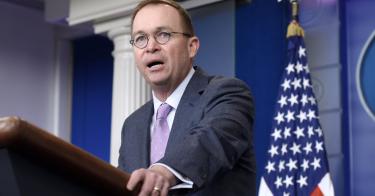The Consumer Financial Protection Bureau (CFPB) has released its first semi-annual report to Congress under Acting Director Mick Mulvaney. Just like the Spring 2017 semi-annual report, issued under Richard Cordray, it opens with a message from the director. And that’s pretty much where the similarities end.
Mulvaney’s message is that “the Bureau will continue to execute the law, but will no longer go beyond its statutory mandate.” Consistent with Section 1012(c)(4) of Dodd-Frank, Mulvaney asks Congress to “establish meaningful accountability for the Bureau” by making four changes to the law:
- Fund the Bureau through Congressional appropriations;
- Require legislative approval of major Bureau rules;
- Ensure that the Director answers to the President in the exercise of executive authority; and,
- Create an independent Inspector General for the Bureau.
Any fan of limited government and free markets should be on board with these types of changes, and anyone interested in holding Congress and the president accountable for the regulations they impose and enforce should be thrilled.
The CFPB has been one of the most controversial components of the 2010 Dodd-Frank Act. During Richard Cordray’s tenure, it issued contentious rules, tortured data to make other rules, engaged in an extravagant spending spree, and even found itself blasted by the Government Accountability Office for employment discrimination.
The CFPB’s funding and structure – a formulaic revenue stream tied to the Federal Reserve, and a sole director rather than a bipartisan commission – were points of conflict from the earliest days of the Bureau.
As a government agency, the CFPB is sui generis. It has independent litigation authority, a single director removable only for cause, a budget immune to the regular appropriations process, broad judicial deference, and an exemption from Office of Management and Budget review of major rules.
No other federal regulator has this combination of characteristics, and no federal agency should. It grants too much power to one person.
Sen. Elizabeth Warren (D-Mass.), chief architect of the CFPB, certainly does not like that Mulvaney is using this power to tame the bureau. But what did she think would happen when the opposing political party was in charge? As former CFPB attorney Ron Rubin notes, “Mulvaney is not, as Warren writes, ‘turning the CFPB into a politicized rogue agency.’ He is showing Democrats that it will continue to be one unless they help restructure it.”
Of course, CFPB proponents have a very different view.
Sen. Warren insists that Congress “designed the CFPB to be the government’s most accountable bank regulator” and to “be a nimble watchdog for America’s consumers.” Other advocates love to give the impression that there would be no consumer protection without the CFPB, and that the CFPB is all that prevents financial firms from fraudulently preying on poor unsuspecting consumers.
This view flies in the face of reality because Congress established a viable consumer protection framework, layered on top of similar state laws, long before the 2010 Dodd-Frank Act created the CFPB. In fact, the bureau derived many of its powers from earlier laws.
Dodd-Frank took authority from approximately 50 existing rules and orders stemming from roughly 20 federal consumer-protection statutes and transferred it to the new bureau. (Of course, Congress went much further than simple consolidation; it designed the CFPB to dictate the types of financial products and services available to consumers instead of allowing them to exercise choice.)
If – and that’s still a big if – all of this authority needed to be consolidated in one government agency, why not do so in the Federal Trade Commission? The FTC’s motto is “protecting America’s consumers,” and the agency has tons of experience protecting consumer welfare and market competition.
For decades, the pre-Dodd-Frank framework outlawed deceptive and unfair practices in financial products and services. Even Sen. Warren acknowledges that “credit transactions have been regulated by statute or common law since the founding of the Republic.”
Congress never should have created a new government agency dedicated to consumer protection in a single sector of the economy, much less created one with such a uniquely independent structure.
Mulvaney’s recommendations for the CFPB are perfectly good policies. Optimally, though, Congress would simply abolish the CFPB. If it does, Americans would be just as protected against unfair, deceptive, and fraudulent practices as they are today.
If Congress insists on going further, then they should move all of the pre-Dodd-Frank consumer protection framework over to the Federal Trade Commission. Protecting consumers is their job.
This piece originally appeared in Forbes https://www.forbes.com/sites/norbertmichel/2018/04/10/mulvaney-seeks-good-reforms-but-america-does-not-need-the-cfpb/#4a4c6c501f5b



